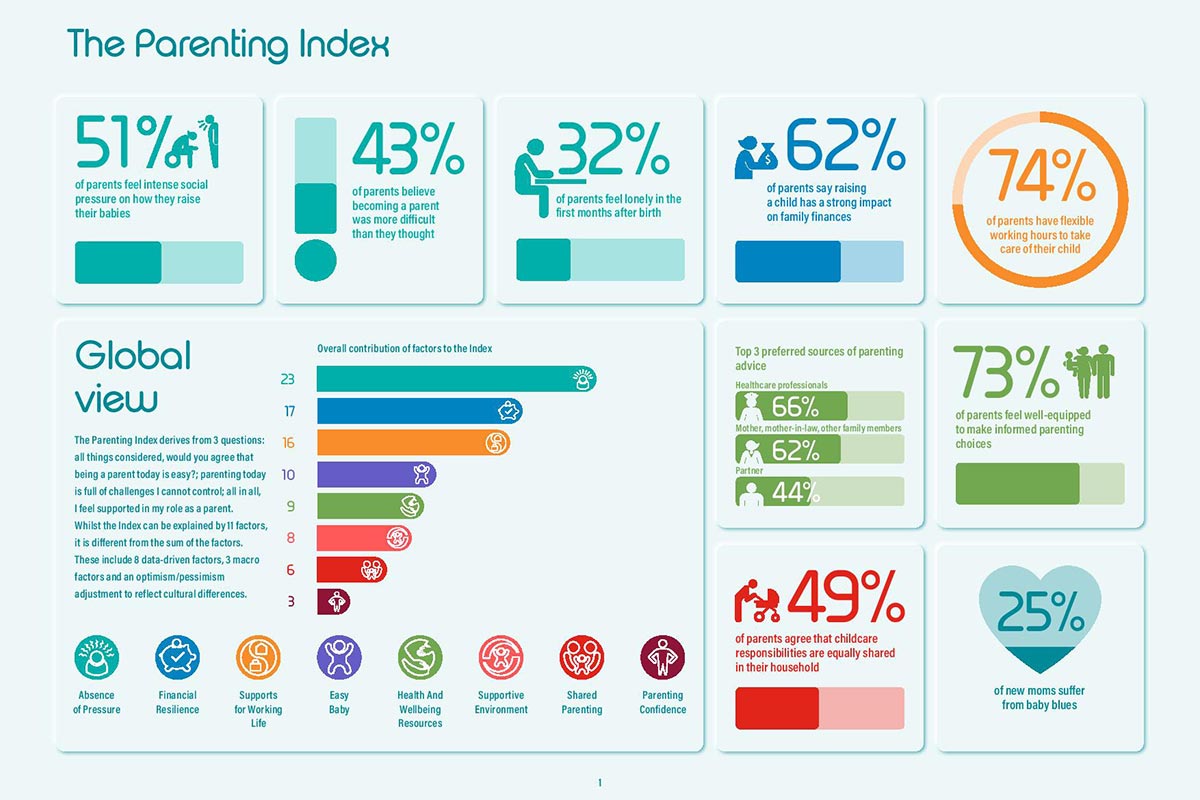Nestlé Reveals – External And Internal Pressures Are The Biggest Problem Of Parents Around The World
The Parenting Index is the new tool that measures the “ease of parenting” around the world and is inspired by the idea that, although parenting is a wonderful life-changing experience, it is not easy. The Parenting Index, First Edition 2021, commissioned by Nestlé is the first survey conducted on this topic, conducted within the Nestlé Parents Initiative to create new insights into the ways parents face the challenges of raising a child and make their lives easier.
The first study analyzing parents’ experiences globally – conducted by a leading research agency, Kantar – shows that societal pressures and parental pressures are the biggest universal problem faced by 60% of parents worldwide.
In order to better understand each other and help all parents raise healthier and happier children, the research encompassed more than 8,000 parents from 16 countries and on four continents, who spoke about their parenting experiences. The data is presented on the basis of a representative sample of families of different sizes, cultures, and socio-economic statuses, with the common denominator being that everyone has a child aged 0 to 12 months.
The Index ranks countries according to how parents assess the “ease of parenthood” in that country and represents the key influencing factors. A total of 11 universal factors were identified, of which eight relied on research data and three on external socio-economic data. Different factors are perceived differently, depending on the country in which the parents live, and the conclusion is that there is no perfect place for parenthood.
Although the factors are universal, the way in which the respondents experienced them differs. Regardless of where parents live, external and internal pressures have the most significant impact and represent the biggest problem that parents face.
The pressure can be internal – in cases when parents set too high standards for themselves and often feel that they are unprepared for the reality of parenthood, which leads to an increased number of compromises. A much stronger impression on parents is left by external pressure, on which parents have little influence, and can have an extremely negative impact on the dynamics of a family.
The Parenting Index, First Edition 2021, commissioned by Nestlé, reveals five universal pressures on parents:
- “Side” advice, i.e., unsolicited advice
- Parent shaming and the role of social networks
- Feeling of loneliness in a hyper-connected world
- Parental guilt, i.e., when parents blame themselves for their abilities (or lack thereof)
- The shock of parenthood, i.e., the lack of readiness among parents to face the new reality
Sweden is the best-ranked country in the research, where parents have the easiest experience. With an index score of 75/100, Swedish parents perceive most factors in a positive light. In second place is Chile with 58/100, and in third place is Germany with 56/100.
The research shows that parents in China face the highest number of challenges (index 39/100), ahead of Brazil (40/100), and then the Philippines (43/100). This score does not suggest that the environment for parents in these countries is difficult by any factor. For example, parents in China are extremely satisfied with the way parental roles are shared.
Parents point out that financial resilience (16.7% of respondents) and support for working life (15.6%) are some of the factors that significantly affect parenting experience. Research shows that about 74% of parents have flexible working hours so they can dedicate themselves to their child. Those who are provided with such working hours think that it is easier for them to cope with the role of a parent.
Key World data:
- 62% of respondents agree that fathers are more active and engaged in child care than the previous generation, and only 49% of respondents agree that responsibilities are shared equally between parents;
- 32% of surveyed parents say that they feel isolated and lonely in a world that is hyper-connected, although they can talk freely with other family members;
- Globally, 25% of respondents say they have gone through postpartum depression;
- Almost a third (31%) of respondents say they were unprepared for all the challenges of parenting;
Parents generally seek advice on their child’s health and well-being from health workers (66%), their mothers and other family members (62%), and from their partners (44%). In addition, 73% of parents surveyed said they had access to information that helped them make the right decisions about the development and well-being of their child.
The current pandemic has had a small but positive impact on the way parents feel in their roles, as they have felt greater mutual support, enhanced social cohesion, and a greater sense of belonging. Parents also felt less pressure on how to raise their children during the pandemic. In the United States, China, and Spain, parents say they have felt stronger financial resilience and lower childcare costs.
As a world leader in child nutrition and with more than 150 years of experience, Nestlé’s expertise and passion aims to make a positive difference to families around the world, which is not limited to nutrition solutions and tips. By listening to and understanding parents ’experiences, Nestlé wants to give parents a voice and help them cope with the pressures they face on a daily basis, because all mothers and fathers should be informed, respected, and supported in the choices they make for themselves and their own children. In order to make a real difference for parents, a joint effort is needed, hence Nestlé invites all those who share the same beliefs to join in forming a new dialogue that will facilitate the path of parenthood today.
